六年级英语上册unit1-5单元单词短语
六年级上册英语一到六单元单词
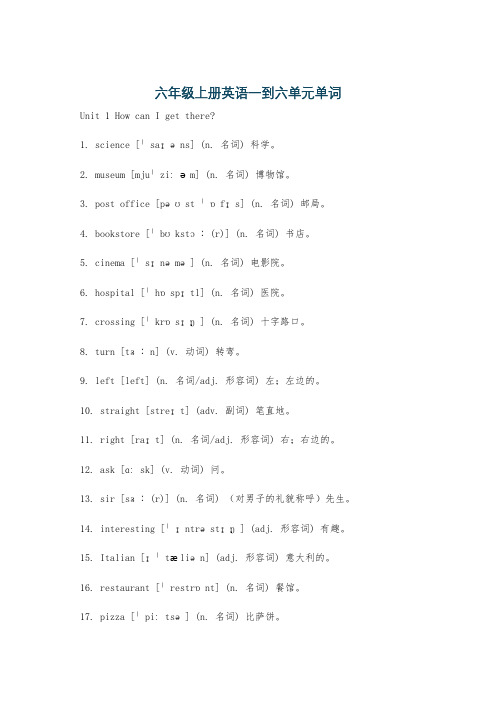
六年级上册英语一到六单元单词Unit 1 How can I get there?1. science [ˈsaɪəns] (n. 名词) 科学。
2. museum [mjuˈziːəm] (n. 名词) 博物馆。
3. post office [pəʊst ˈɒfɪs] (n. 名词) 邮局。
4. bookstore [ˈbʊkstɔː(r)] (n. 名词) 书店。
5. cinema [ˈsɪnəmə] (n. 名词) 电影院。
6. hospital [ˈhɒspɪtl] (n. 名词) 医院。
7. crossing [ˈkrɒsɪŋ] (n. 名词) 十字路口。
8. turn [tɜːn] (v. 动词) 转弯。
9. left [left] (n. 名词/adj. 形容词) 左;左边的。
10. straight [streɪt] (adv. 副词) 笔直地。
11. right [raɪt] (n. 名词/adj. 形容词) 右;右边的。
12. ask [ɑːsk] (v. 动词) 问。
13. sir [sɜː(r)] (n. 名词) (对男子的礼貌称呼)先生。
14. interesting [ˈɪntrəstɪŋ] (adj. 形容词) 有趣。
15. Italian [ɪˈtæliən] (adj. 形容词) 意大利的。
16. restaurant [ˈrestrɒnt] (n. 名词) 餐馆。
17. pizza [ˈpiːtsə] (n. 名词) 比萨饼。
18. street [striːt] (n. 名词) 大街;街道。
19. get [ɡet] (v. 动词) 到达。
20. GPS [ˌdʒiː piːˈes] (n. 名词) 全球(卫星)定位系统。
Unit 2 Ways to go to school.1. on foot [ɒn fʊt] (adv. 副词短语) 步行。
2. by [baɪ] (prep. 介词) (表示方式)乘。
六年级上册1~6单元英语单词表
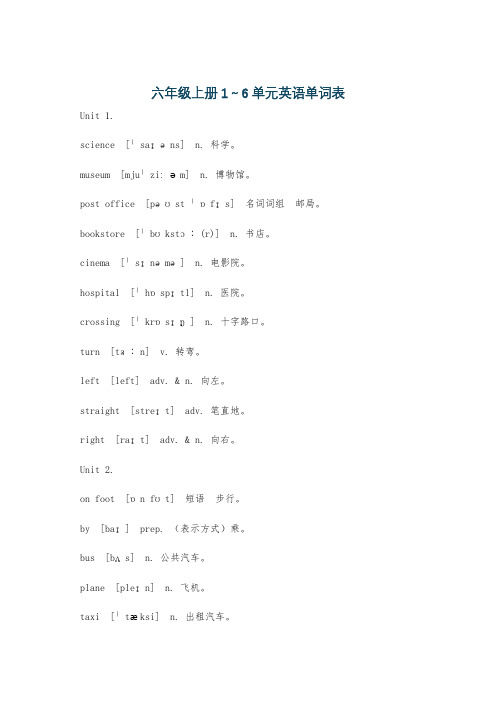
六年级上册1~6单元英语单词表Unit 1.science [ˈsaɪəns] n. 科学。
museum [mjuˈziːəm] n. 博物馆。
post office [pəʊst ˈɒfɪs] 名词词组邮局。
bookstore [ˈbʊkstɔː(r)] n. 书店。
cinema [ˈsɪnəmə] n. 电影院。
hospital [ˈhɒspɪtl] n. 医院。
crossing [ˈkrɒsɪŋ] n. 十字路口。
turn [tɜːn] v. 转弯。
left [left] adv. & n. 向左。
straight [streɪt] adv. 笔直地。
right [raɪt] adv. & n. 向右。
Unit 2.on foot [ɒn fʊt] 短语步行。
by [baɪ] prep. (表示方式)乘。
bus [bʌs] n. 公共汽车。
plane [pleɪn] n. 飞机。
taxi [ˈtæksi] n. 出租汽车。
ship [ʃɪp] n. (大)船。
subway [ˈsʌbweɪ] n. 地铁。
train [treɪn] n. 火车。
slow [sləʊ] adj. 慢的。
down [daʊn] adv. 减少;降低。
slow down [sləʊ daʊn] 短语慢下来。
Unit 3.visit [ˈvɪzɪt] v. 拜访。
film [fɪlm] n. 电影。
see a film [siːə fɪlm] 短语看电影。
trip [trɪp] n. 旅行。
take a trip [teɪk ə trɪp] 短语去旅行。
supermarket [ˈsuːpəmɑːkɪt] n. 超市。
evening [ˈiːvnɪŋ] n. 晚上;傍晚。
tonight [təˈnaɪt] adv. 在今晚。
tomorrow [təˈmɒrəʊ] adv. 明天。
next week [nekst wiːk] 短语下周。
六年级上册1~6单元英语笔记
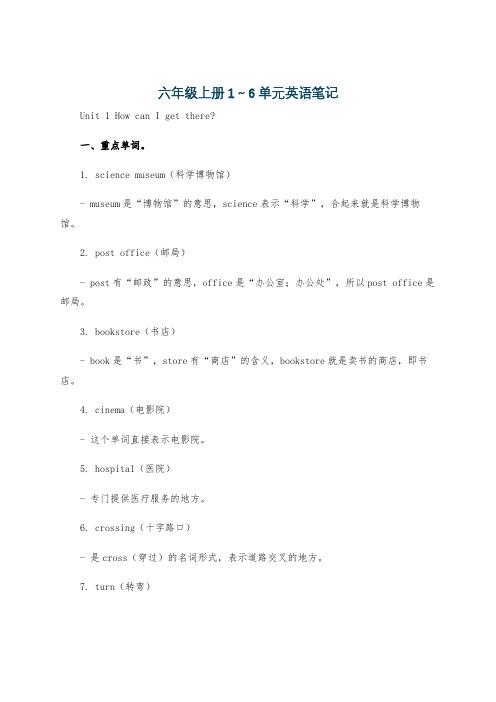
六年级上册1~6单元英语笔记Unit 1 How can I get there?一、重点单词。
1. science museum(科学博物馆)- museum是“博物馆”的意思,science表示“科学”,合起来就是科学博物馆。
2. post office(邮局)- post有“邮政”的意思,office是“办公室;办公处”,所以post office是邮局。
3. bookstore(书店)- book是“书”,store有“商店”的含义,bookstore就是卖书的商店,即书店。
4. cinema(电影院)- 这个单词直接表示电影院。
5. hospital(医院)- 专门提供医疗服务的地方。
6. crossing(十字路口)- 是cross(穿过)的名词形式,表示道路交叉的地方。
7. turn(转弯)- 既可以作动词,如turn left(向左转),turn right(向右转);也可以作名词。
二、重点短语。
1. near(在……附近)- 例如:The post office is near the bookstore.(邮局在书店附近。
)2. next to(紧挨着;与……相邻)- My home is next to the cinema.(我的家紧挨着电影院。
)3. in front of(在……前面)- There is a tree in front of my house.(我家前面有一棵树。
注意:in front of是在物体外部的前面,而in the front of是在物体内部的前面,如There is a blackboard in the front of the classroom.教室里前面有一块黑板。
)4. behind(在……后面)- The cat is behind the box.(猫在盒子后面。
)5. go straight(直走)- Go straight and you can see the hospital.(直走你就能看到医院。
新版pep六年级上册英语各单元知识点总结
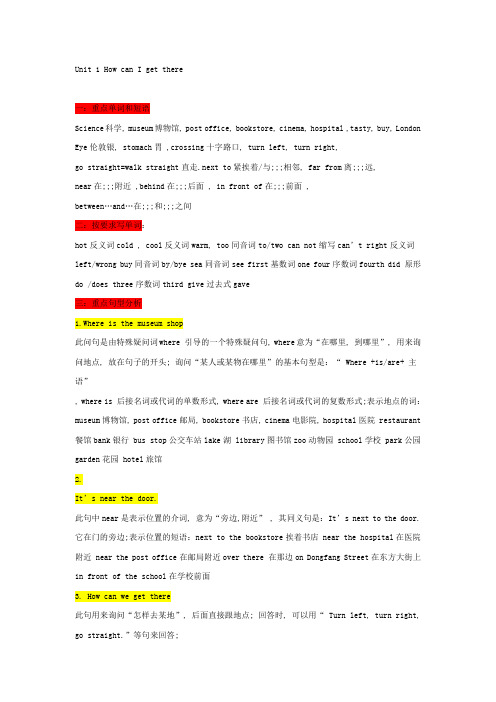
Unit 1 How can I get there一:重点单词和短语Science科学, museum博物馆, post office, bookstore, cinema, hospital ,tasty, buy, London Eye伦敦银, stomach胃 ,crossing十字路口, turn left, turn right,go straight=walk straight直走.next to紧挨着/与;;;相邻, far from离;;;远,near在;;;附近 ,behind在;;;后面 , in front of在;;;前面 ,between…and…在;;;和;;;之间二:按要求写单词:hot反义词cold , cool反义词warm, too同音词to/two can not缩写can’t right反义词left/wrong buy同音词by/bye sea同音词see first基数词one four序数词fourth did 原形do /does three序数词third give过去式gave三:重点句型分析1.Where is the museum shop此问句是由特殊疑问词where 引导的一个特殊疑问句, where意为“在哪里, 到哪里”, 用来询问地点, 放在句子的开头; 询问“某人或某物在哪里”的基本句型是:“ Where +is/are+ 主语”, where is 后接名词或代词的单数形式, where are 后接名词或代词的复数形式;表示地点的词:museum博物馆, post office邮局, bookstore书店, cinema电影院, hospital医院 restaurant 餐馆bank银行 bus stop公交车站lake湖 library图书馆zoo动物园 school学校 park公园garden花园 hotel旅馆2.It’s near the door.此句中near是表示位置的介词, 意为“旁边,附近” , 其同义句是:It’s next to the door.它在门的旁边;表示位置的短语:next to the bookstore挨着书店 near the hospital在医院附近 near the post office在邮局附近over there 在那边on Dongfang Street在东方大街上in front of the school在学校前面3. How can we get there此句用来询问“怎样去某地”, 后面直接跟地点; 回答时, 可以用“ Turn left, turn right, go straight.”等句来回答;同义句:1.Can you tell me the way to+地点2.Where is the +地点3.Which is the way to +地点4.Turn left at the bookstore. Then turn right at the hospital.此句是指路的句型; 常用到的句型有:turn left, 向左转turn right, 向右转go straight直着走;同时表示在某处的介词用at.5.Is the Thames far from hereNo, it isn’t.此句是个be动词开头的一般疑问句, 其回答要用Yes或No. 句中的far from意为“离……远”;反义词组为next to.Unit 2 Ways to go to school一:重点单词和短语on foot步行, by bus =take a bus 乘公交车 by plane,乘飞机 by taxi 乘出租车by ship乘船 by subway 乘地铁by train乘火车 by bike骑自行车by ferry 乘轮渡Hooray好极了slow down 慢下来, stop 停 wait等 pay attention to注意 cross the road 横穿马路 traffic light通信号灯at home在家 missedmiss的过去式想念different,不同chopsticks,筷子复数cross穿过look right向右看 same 相同的door门look at朝;;;看play with和;;;一起玩二:按要求写单词:go 反义词come foot复数feet child复数childrenearly反义词late good反义词bad坏 take带走反义词bring拿来slow反义词quick/fast go 过去式went do过去式 diddo第三人称单数 doesgo第三人称单数 goessame 相同的反义词different不同的miss过去式 missedwrong 错误反义词right正确 can否定形式can’t三:重点句型分析1.How do you come to school你们怎么来学校的此问句是由特殊疑问词how引导的特殊疑问句, 用于询问对方的出行方式; 回答时要根据具体情况作答;表示地点的词:Germany德国 Munich慕尼黑 England英国 Australia澳大利亚school学校 the park 公园the cinema电影院 the hospital医院 the post office邮局the bus stop公共汽车站 home家2.Usually, I come on foot.=Usually, I walk.通常情况下,我步行来;此句是对出行方式的回答句; 其中usually意为“通常”, 表示频率很大, on foot意为“步行”; 一般用by表示出行方式; By后面一定要直接加交通工具的单数形式, 只有“小脚丫”foot与on 搭配, “步行”用on foot表示;3.I must pay attention to the traffic lights.我必须注意交通信号灯; Must是情态动词,意为“必须”后面跟动词原形;动作词组:wear a helmet戴头盔 pay attention to the traffic lights注意交通信号灯look right向右看4.Don’t go at the red light别闯红灯此句是Don’t开头的否定祈使句, don’t后面跟动词原形;意为“不要做某事”;动作词组:run跑 go at the red light闯红灯 touch the door触摸门Eg. Don’t smoke.不要吸烟;/禁止吸烟;Don’t take photos.禁止拍照;5We must look right before crossing the road.我们在横穿马路前必须看看右边;此句中must是情态动词, 意为“必须”后面跟动词原形, 在此句中before是一个介词, 而介词后面跟动词-ing形式;6. There is no door on the bus.公共汽车上没有门;此句是there be句型的单数句, be动词要根据后面名词的单复数形式来决定, 名词为单数或不可数名词就用there is, 名词为复数就用there are. 此句中no door意为“没有门”, 表示单数含义,因此要用there is开头;Unit 3 My weekend plan一:知识点小结重点单词和短语visit拜访film电影 see a film看电影 trip旅游take a trip去旅游supermarket, 超市evening晚上,傍晚 tonight在今晚tomorrow明天next week下周dictionary 字典comic 滑稽的comic book连环画册word book单词本postcard明信片learn 学习teach教disturb打扰 without没有pool池子 jump in跳进 remember记住 lesson 课space太空 travel尤指长途旅游 half一半 price 价格moon月亮make a snowman 堆雪人share sth事 with sb人和某人分享某物lots of= a lot of 许多二:按要求写单词look for 同义词 find leaf 复数 leaves picture 复数 picturessee 同义词 watch/look film 同义词 movie buy 反义词 sellam /is /are 原形 be is /am 复数are this 反义词 thatgoing 原形 go swim 现在进行时swimming can否定形式can’ttoo同音词 two /to clothe复数clothes ice-skate现在进行时ice-skating autumn同义词 fall autumn反义词spring teach 反义词 learn三:重点句型分析1.---What are you going to do tomorrow---I’m going to have an art lesson.此句是个一般将来时态的特殊疑问句; 用了be going to 结构; “be going to +动词原形”构成一般将来时态, 表示计划、安排将要做的事或根据目前推测将要发生的动作, 意为“打算, 将要”;表示时间的单词:evening晚上,傍晚 tonight在今晚tomorrow明天next week 下周this morning今天早晨 this afternoon今天下午 this evening 今天晚上 this weekend 下周末动词短语原形:make a snowman 堆雪人 take a trip去旅游see a film看电影 visit my grandparents 拜访祖父母watch TV看电视learn how to swim学怎样游泳go skating去滑冰row a boat划船go fishing 去钓鱼 go skiing去滑雪 go shopping去购物 make mooncakes做月饼 read a poem读诗eg: I’m going to make a snowman.我打算去堆雪人;We’re going fishing.我们打算去钓鱼;2.We are going to draw some pictures in Renmin Park.此句是be going to 结构的肯定句式; 基本结构为:主语+ be going to +动词原形+表示将来的时间;Some一些,用于肯定句中, 后接可数名词的复数形式或不可数名词, 而在疑问句或否定中表示一些要用any;3---Where are you going---We’re going to the cinema.此句是where 引导的一般将来时态的特殊疑问句, where意为“哪里”, 它是对地点提问的特殊疑问词, 因此回答时要回答一个具体的地点;表示地点的词:school学校 park 公园 cinema电影院 hospital医院 post office邮局 bus stop公共汽车站 home家 supermarket超市museum博物馆, bookstore书店 , restaurant餐馆bank银行lake湖 library图书馆zoo动物园park公园garden花园 hotel旅馆4---When are you going---Next Monday.此句中when意为“什么时候, 何时”, 它引导的疑问句用来对年、月、日等时间进行提问; 如:---When do you go to school in the morning---At 8:00.5---How can you learn to swim without going to a pool此句是由how 引导的特殊疑问句, 询问别人做事的方式、方法; 句中的can 意为“能够”, 是情态动词,后面跟动词原形; “learn to do something,”学习做某件事, 一般表示还没学或还没做的事情,含义将来的意思;第四单元Unit 4 I have a pen pal一、重点单词和短语pen pal笔友hobby爱好 idea主意studies学习第三人称单数 puzzle谜语hiking徒步旅行forest森林 gift礼物 sometimes有时 angry,生气shout大喊 bushy浓密的 have to不得不get … from…,从;;;得到;;;reading books 读书read stories读故事 do kung fu练功夫 play sports 进行体育运动play the pipa 弹琵琶climb mountains爬山 listen to music听音乐 sing English songs 唱英文歌fly kites放风筝 on a farm在一个农场里 write an e mail to 给;;;写封电子邮件 on the playground在运动场上六 live in住在;;;按要求写单词二、按要求写单词have第三人称单数 has do三单形式does do 否定形式don’tdoes 否定形式doesn’t like 三单形式likes he 所有格形式 histalk动词-ing形式 talking hobby三单形式hobbies story三单形式 stories read三单形式 reads live三单形式 lives swim动词-ing形式 swimmingdo动词-ing形式 doing sing动词-ing形式 singing go动词-ing形式 going teach动词-ing形式 teaching also同义词 too play动词-ing形式 playing student复数students dance动词-ing形式dancing write动词-ing形式writing puzzle复数puzzles hike动词-ing形式 hiking learn动词-ing形式learningfriend复数 friends cook三单形式cooks study三单形式 studiesgo 三单形式goes teach三单形式teaches different反义词 samemake三单形式makes talk 三单形式talks love 三单形式lovessleep三单形式 sleeps let三单形式lets sing三单形式 singsdance 三单形式dances sang 原形sing was原形 is/amthrew原形throw looked原形 look did原形do/does true反义词false三、重点句型分析1.问:What are sb’s hobbies 某人的爱好是什么询问某人的爱好答:主语 +like/likes +动词-ing形式+其他; ;;;喜欢;;;此处是对别人的爱好提问及回答的句型,问句中一般hobby要用复数形式, 因为别人的爱好不只一个, 特别注意hobby一词的复数形式变化规则, 变y为i再加-es;答句是一般现在时态的三单人称的句型; 当主语是第三人称单数时, 后面的动词要用它的第三人称单数形式, 同时like意为“喜欢”, 而喜欢做某事2.结构:like + v-ing 即like 后面跟动词的-ing形式Eg: What are Peter’s hobbies He likes reading stories.动词-ing形式:singing唱歌 dancing跳舞 reading stories 读故事playing football踢足球 doing kung fu 练功夫doing word puzzle猜字谜 go hiking 远足 watching TV看电视 drawing pictures 画画listening to music听音乐going fishing 钓鱼3、Does he live in SydneyNo, he doesn’t.此句是助动词does开头的一般疑问句; 其回答要根据助动词和主语来决定;结构为“Does+ 三单人称+ 动词原形”, 肯定回答结构: Yes, 主语+ does, 否定回答结构: No, 主语+ doesn’t. 4、So he doe sn’t like Zac’s music.此句是含有实意动词的否定句, 其结构为:主语+ don’t/ doesn’t+ 动词原形+其他; 当主语是第三人称单数时, 后面的否定助动词要用doesn’t而不是don’t;Unit 5 What does he do 知识点总结一:重点单词和短语factory工厂 worker,工人postman,邮递员businessman商人 police officer警察fisherman 渔民 scientist,科学家pilot飞行员 coach教练job工作, tamer驯服手 dangerous危险farmer农民 honey蜂蜜 stung叮 assistant助手接待员cracker骇客解密高手 nuts果仁think of考虑/有;;;想法go to work去工作 study hard努力学习 stay healthy保持健康 go home 回家 lots of许多 go to the camp去度假营 be good at擅长;;;head teacher校长二:按要求写词语do三单 does work三单 works he主格 his所有格 him宾格she主格 her宾格或所有格 business名词 businessmanfish名词 fisher can 否定形式can’t drive 名词driver teach 名词teacher country复数countries clean名词cleaner write 名词writer sing名词singer dancer 动词dance player 动词 play worker动词 work is否定形式isn’tgo现在分词 going see三单 sees big 反义词smalltall 反义词short thin反义词 fat/strong short 反义词tall/longsea同音词 see lots of =a lot of has 原形havehealthy名词 health life 动词live hard反义词 easy stay三单 stays study 三单studies science名词 scientist university复数 universities those反义词 thesedifferent 反义词same like三单 likes go三单 goes want三单 wants run现在分词 running report 名词reporter use现在分词 using quick 副词quickly they主格 them宾格 their所有格 children 单数child didn’t 否定形式don’t /doesn’t unusal 反义词usual dangerous 反义词safe farm名词 farmer test名词 tester eat 现在分词eating have三单has三:重点句型分析1.What does he doHe’s a businessman.这是一个询问职业的句型, 它的构成是“ What do/ does+某些人+do”, 可以用“某人+ be+a/an+职业名词”来回答; 询问职业还有一个句型是“ What + be+某人”; 如上面的句子还可以说“ What is he ”;表示职业的词:worker工人 postman邮递员businessman商人coach教练police officer警察 fisherman渔民 scientist,科学家pilot飞行员tamer驯服手farmer农民assistant助手接待员teacher老师 cleaner清洁工doctor医生nurse护士 dentist牙医 tailor裁缝 salespersons售货员 pianist钢琴家2 .---Where does he work---He works at sea.当你想询问他人在哪儿工作时, 用“ Where do/ does+ 某些人+ work”这个句型; 我们通常用一个表示地点的介宾短语来回答这个句型; 介宾短语是由介词加上名词或代词构成的;表示地点的介词短语:at a university 在一所大学in a gym在一个体育馆at sea 在海上on a boat在船上 at the zoo在动物园 in a school 在一所学校in a car company在一家汽车公司 in a bank在一家银行3. ---How does he go to work---He goes to work by bike.要询问别人的上班方式, 可以用“ How do/ does+人物+ go to work”句式来询问, 回答时要用到”by+交通工具的单词“或者是on foot;表示交通方式的词: by the No.15 bus乘15路公交车on foot步行,by bus 乘公交车 by plane,乘飞机 by taxi 乘出租车by ship乘船by subway 乘地铁bytrain乘火车 by bike骑自行车by ferry乘轮渡4. What a great job此句是由“what”引导的感叹句:“what”意为“多么”用作定语,修饰名词被强调部分,单数可数名词前要加不定冠词a/an,复数可数名词或不可数名词前不用冠词;这类句子的结构形式是:What+a/an+形容词+名词+主语+谓语+it is. 如:What a clever girl she is多么聪明的姑娘呀Unit6 How do you feel一:重点单词和短语Angry生气afraid害怕 sad伤心worried担心 happy快乐see a doctor看医生wear穿 more,更多deep身 breath呼吸 take a deep breath深呼吸count to ten 数到十popcorn爆米花make,制作wait等check检查planted种植的过去式grow生长或成长a little worried有一点点担心be angry with…与;;;生气be afraid of ;;;害怕;;;domore exercise做更多的运动 wear warm clothes穿暖和的衣服 get some drinks 拿一些饮料 have some popcorn 吃一些爆米花chase the mice追赶老鼠二:按要求写词语First基数词one chase 三单chases mice单数 mouse chase 现在分词chasing these 反义词those these单数 this sad反义词 happy here反义词 there can’t 肯定形式can can’t 完全形式can not don’t完全形式 do not feel 三单feels friends 单数friend suggestions单数 suggestion warm 反义词cool cold 反义词hot clothes单数clothe much 比较级more worry形容词worried sunny名词 sun hears 动词原形hear say 三单says strong反义词thin strong 近义词fat should否定形式shouldn’t picture复数 pictures ant复数 ants tell反义词 retell hungry反义词 full bad 反义词good ill 反义词 healthy making原形 make doing 原形do planted 原形plant plant 动词过去式 planted waiting动词原形 wait三:重点句型分析1.They are afraid of him.此句中be afraid of 意为“ 害怕某人”; 例如: I am afraid of my maths teacher. 我害怕我的数学老师;2.The cat is angry with them.此句中be angry with意为“ 对某人生气”;例如: I broken the cup. My mother is angry with me. 我打碎了杯子; 妈妈对我很生气;3.What’s wrong此句用于询问对方有什么问题或有什么不顺心的事情, 意为:怎么啦出什么事了例如:A: What’s wrong, Jim 吉姆,你怎么啦B: Maybe I am ill. 也许我病了;4.He should see a doctor this morning建议某人应该做某事的句型此句中should 为情态动词,表示“应该,应当”;此句用来给别人提建议;例如:He should work harder. 他应该更加努力;You should help your mother with the housework. 你应该帮你母亲做家务;5. What are you doing此句是现在进行时态的特殊疑问句, 其基本结构为:疑问词+be+主语+其他例如:What is he doing now回答:He is swimming.肯定句结构为:主语+be+动词-ing形式+其他.例如:We are running now。
人教版PEP英语六年级英语上册各单元单词短语句型全总结
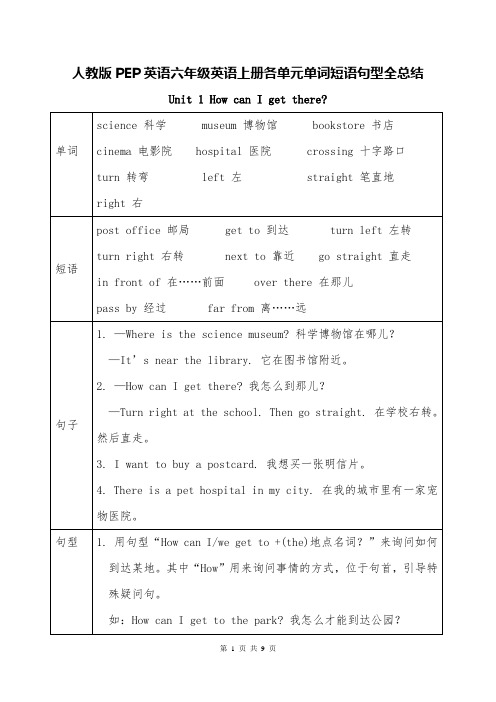
Unit 3 My weekend plan
单词
visit 拜访 film 电影 trip 旅行
supermarket 超市 evening 晚上;傍晚 tonight 在今晚
tomorrow 明天 dictionary 词典 comic 滑稽的
right 右
短语
post office 邮局 get to 到达 turn left 左转
turn right 右转 next to 靠近 go straight 直走
in front of 在……前面 over there 在那儿
pass by 经过 far from 离……远
句子
1. —Where is the science museum? 科学博物馆在哪儿?
businessman 商人;企业家 fisherman 渔民
scientist 科学家 pilot 飞行员 coach 教练
短语
police officer 警察 factory worker 工厂工人
head teacher 校长 look like 看起来像
lots of 许多;大量的 healthy life 健康的生活
—He works in a car factory. 他在一家汽车工厂工作。
Unit 6 How do you feel?
单词
angry 生气的 afraid 害怕 sad 难过的
worried 担心的;发愁的 happy 高兴的 wear 穿
more 更多的 deep 深的 breath 呼吸 count 数数
新版PEP小学英语六年级上册1-6单元知识点总结
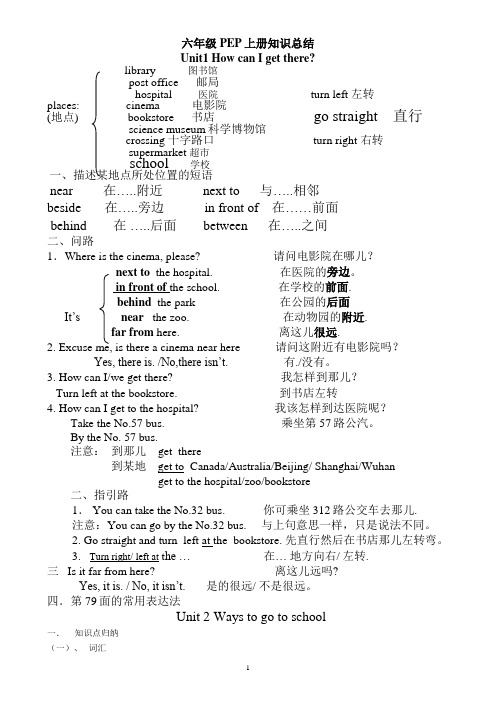
六年级PEP上册知识总结Unit1 How can I get there?library 图书馆post office 邮局hospital 医院turn left 左转places: cinema 电影院(地点) bookstore 书店go straight 直行science museum科学博物馆crossing 十字路口 turn right 右转supermarket 超市school 学校一、描述某地点所处位置的短语near 在…..附近 next to 与…..相邻beside 在…..旁边 in front of 在……前面behind 在…..后面 between 在…..之间二、问路1.Where is the cinema, please? 请问电影院在哪儿?next to the hospital. 在医院的旁边。
in front of the school. 在学校的前面.behind the park 在公园的后面It’s near the zoo. 在动物园的附近.far from here. 离这儿很远.2. Excuse me, is there a cinema near here 请问这附近有电影院吗?Yes, there is. /No,there isn’t. 有./没有。
3. How can I/we get there? 我怎样到那儿?Turn left at the bookstore. 到书店左转4. How can I get to the hospital? 我该怎样到达医院呢?Take the No.57 bus. 乘坐第57路公汽。
By the No. 57 bus.注意:到那儿 get there到某地 get to Canada/Australia/Beijing/ Shanghai/Wuhanget to the hospital/zoo/bookstore二、指引路1. You can take the No.32 bus. 你可乘坐312路公交车去那儿.注意:You can go by the No.32 bus. 与上句意思一样,只是说法不同。
小学英语六年级上册1-6单元知识点总结
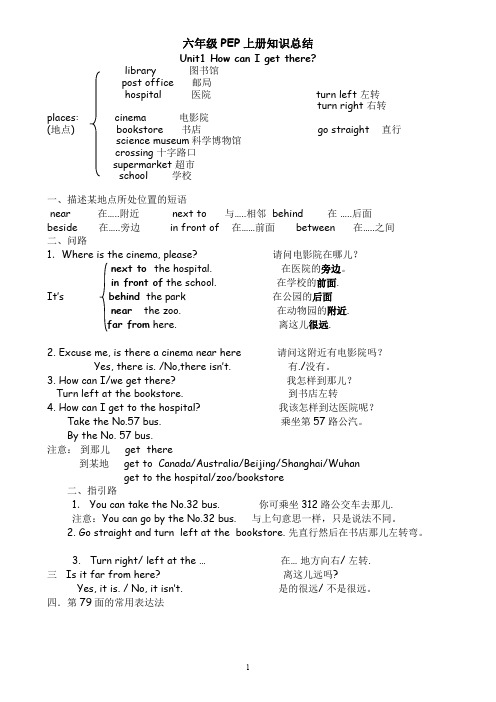
六年级PEP上册知识总结Unit1How can I get there?library图书馆post office邮局hospital医院turn left左转turn right右转places:cinema电影院(地点)bookstore书店go straight直行science museum科学博物馆crossing十字路口supermarket超市school学校一、描述某地点所处位置的短语near在…..附近next to与…..相邻behind在…..后面beside在…..旁边in front of在……前面between在…..之间二、问路1.Where is the cinema,please?请问电影院在哪儿?next to the hospital.在医院的旁边。
in front of the school.在学校的前面.It’s behind the park在公园的后面near the zoo.在动物园的附近.far from here.离这儿很远.2.Excuse me,is there a cinema near here请问这附近有电影院吗?Yes,there is./No,there isn’t.有./没有。
3.How can I/we get there?我怎样到那儿?Turn left at the bookstore.到书店左转4.How can I get to the hospital?我该怎样到达医院呢?Take the No.57bus.乘坐第57路公汽。
By the No.57bus.注意:到那儿get there到某地get to Canada/Australia/Beijing/Shanghai/Wuhanget to the hospital/zoo/bookstore二、指引路1.You can take the No.32bus.你可乘坐312路公交车去那儿.注意:You can go by the No.32bus.与上句意思一样,只是说法不同。
六年级上册英语一到六单元知识总结
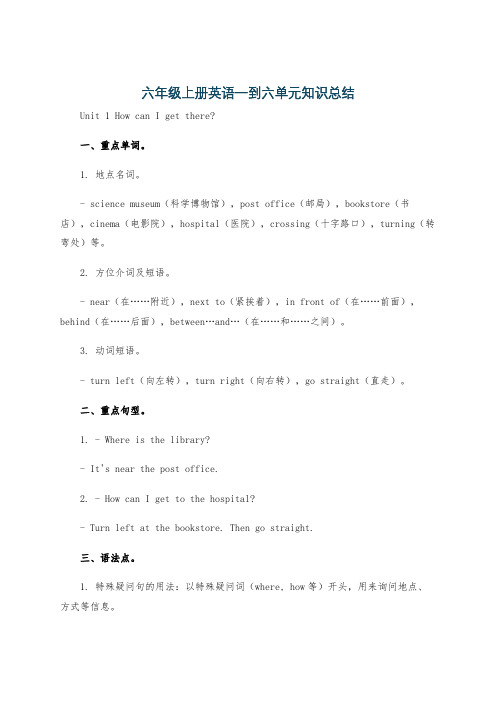
六年级上册英语一到六单元知识总结Unit 1 How can I get there?一、重点单词。
1. 地点名词。
- science museum(科学博物馆),post office(邮局),bookstore(书店),cinema(电影院),hospital(医院),crossing(十字路口),turning(转弯处)等。
2. 方位介词及短语。
- near(在……附近),next to(紧挨着),in front of(在……前面),behind(在……后面),between…and…(在……和……之间)。
3. 动词短语。
- turn left(向左转),turn right(向右转),go straight(直走)。
二、重点句型。
1. - Where is the library?- It's near the post office.2. - How can I get to the hospital?- Turn left at the bookstore. Then go straight.三、语法点。
1. 特殊疑问句的用法:以特殊疑问词(where, how等)开头,用来询问地点、方式等信息。
2. 一般现在时在问路指路中的运用。
Unit 2 Ways to go to school.一、重点单词。
1. 交通工具名词。
- by bike(骑自行车),by bus(乘公共汽车),by train(乘火车),by plane(乘飞机),on foot(步行),ship(轮船),subway(地铁)等。
2. 形容词。
- slow(慢的),fast(快的)。
3. 其他。
- traffic(交通),traffic lights(交通灯),stop(停),wait(等)。
二、重点句型。
1. - How do you come to school?- Usually, I come on foot.2. - How can I get to the Fuxing Hospital?- Take the No. 57 bus over there.三、语法点。
英语六年级上册各个单元短语总结

六上Unit 11.long long ago很久以前2. new clothes新衣服3. make new clothes for you为你制作新衣服make sth for sb4. show the king his new clothes给皇帝展示新衣服show sb. sth.= show sth. to sb.5. try on试穿try on the coat=try the coat on try it/them on6.magic clothes有魔力的衣服7. walk through步行穿过8. in his new clothes 穿着他的新衣服9. shout at sb.对某人大叫10. laugh at sb.嘲笑某人11. look at 看….12. point at指向…13. fit well 非常适合14. an American cowboy 一个美国牛仔15. a Scottish man 一位苏格兰人16. tell a story 讲一个故事17. say a/one sentence说一句话18. on the mountain在山上19. the next sentence下一句话20. live in the house住在房子里21. tell the boy a story给这个男孩讲一个故事tell sb. sth.22. it is one’s turn 某人的机会23. think hard努力思考24. have to 不得不have to do sth.25. in front of 在….前面(外部)in the front of 在… 前面(内部)26. walk by 路过27. be nice to sb.对某人好28. look after 照顾29. turn into变成六上Unit 2What a day! 糟糕的一天;忙碌的一天;累人的一天等等(表达的含义很多,根据具体语境来看)这里指“糟糕的一天”1. the 19th of September 在九月十九号2. a sunny/ windy / rainy day 晴朗的/ 刮风/下雨的一天3. a lot of rain 许多雨(不可数)4. a lot of snow 许多雪(不可数)5. see/ watch a parrot show 观看一场鹦鹉表演6. see some interesting parrots看见一些有趣的鹦鹉7. an interesting film 一部精彩的电影8. become windy and cloudy变成大风和阴天(多云)9. fly kites high in the sky风筝放得高10. bring some dumplings带来一些饺子11. bring lunch 带午餐12. some bread and honey 一些面包和蜂蜜13. some drinks 一些饮料14. hungry and thirsty 又饿又渴15. wet clothes 潮湿的衣服16. have/ eat our lunch吃我们的午饭17. black clouds乌云18. meet me/ him/ her/ them/ you 遇见我/他/ 她/ 他们/ 你19. look sad/ happy 看起来很伤心/ 开心20. this morning/ afternoon/ evening 今天早晨/ 下午/ 晚上21. climb up the hill 爬上山22. get up at seven 七点起床23. go to school by bike 骑自行车去上学24. have a picnic野餐25. watch a film看电影26. in the sky在空中27. all day 一整天28. go away 走了29. lose my kite丢了我的风筝30. want to know why想要知道为什么31. what happened出了什么事32. fly too high飞得太高33. find it 找到它34. near the hill 在小山附近35. in your diary 在你的日记里36. hold onto it抓紧它37. fly away飞走了38. find it near the hill在山的附近找到它39. in your diary在你的日记里40. cheer together一起欢呼六上Unit 3e back to school 返校2. the National Day holiday 国庆节假期3.call you 打电话给你4. visit my aunt拜访我的婶婶5. Shanghai Museum上海博物馆6. see many interesting things看见很多有趣的东西7. go to a farm 去农场8. near Star Lake 在星湖附近9. pick some oranges摘一些橙子10. go fishing去钓鱼11. catch a big fish抓到一条大鱼12. Tian’anmen Square天安门广场13. Palace Museum故宫博物院14. Summer Palace 颐和园15. the Great Wall长城16. pick an orange for me为我摘一个橙子17. main school holidays学校主要的假期18. the Easter holiday复活节假期19. the summer holiday暑假20. the Christmas holiday圣诞节假期21. come home late晚回家22. have a fashion show有一场时装秀23. love beautiful clothes爱漂亮的衣服24. be excited about the show 对秀感到激动25 wear paper clothes 穿纸衣服26. wear a lot of bottles穿很多瓶子27. ask about the show询问关于秀的事28. go well进展顺利29. at first在开始的时候30. heavy rain大雨31. the Car Museum轿车博物馆32. visit his cousin拜访他的表兄33. have a birthday party举行一个生日聚会34. catch a fish for me为我抓一条鱼六上Unit 41.then and now过去和现在2.six years ago六年前3. do many things做很多事4. write letters to his friends = write to his friends写信给他的朋友5. in the office在办公室里6. use the telephone使用电话7. call people打电话给人们8. a mobile phone一部手机9. call people anywhere随处打电话给人们10. write/send an email写/发一封电子邮件11. listen to the radio听收音机12. watch news on the Internet在网上看新闻13. read e-books看电子书14. make friends with sb. 与某人交朋友15. e-friends from all over the world来自世界各地的网友16. do shopping = do the shopping = do some shopping = go shopping购物17. work hard努力工作18. invent the aeroplane发明飞机19. an American man一位美国男士20. a British girl一个英国女孩21. have an English lesson上一节英语课22. look out of the window朝窗外看23. listen to me听我说24. go on继续25. spell the new words拼写新单词26. get angry = be angry生气的27. make a sentence with …用…来造句28. wait for the answer等待答案29. a photo of yourself一张你自己的照片30. just now刚才31. a moment ago一会儿以前32. read newspapers for news看报纸上的新闻33. buy things from shops从商店买东西34. use …to… 用…做…35.read and draw 读和画36.do shopping on the Internet 在网上购物37.surf the Internet 网上冲浪38.buy me a mobile phone/buy a mobile for me 给我买手机e the phone to call you 用电话打给你38.like making friends 喜欢交朋友。
六年级上册词汇表(教科版)完美排版

六年级上册词汇表(教育科学出版社)VocabularyUnit1 What are those farmers doing? field n.田pick v.摘grass v.草feed v.饲养;喂养give v.给cow n.奶牛;母牛sheep n.绵羊(单复数一样)other adj.其他;别的pron.其他的人(或事)few adj.极少;几乎没有a few 几(个、条、……)* goat n.山羊* goose n.鹅(复数是geese) river n.河;江Unit 2 A country life is a healthy life country n.农村life n.生活grandparent n.祖父(母),外祖父(母)a.m. abbr.上午milk v.挤奶ride v.骑(过去式是rode)take v.花费still adv.仍然help... with... 在……(方面)帮助air n.空气Unit 3 Where are you from? city n.城市student n.学生New York n.纽约America n.美国;美洲quiet adj.安静的cheap adj.便宜的modern adj.现代化的noisy adj.嘈杂的wide adj.宽阔的crowded adj.拥挤的hotel adj.酒店,宾馆comfortable adj.舒服的heavy adj.拥挤的;大量的slow adj.慢、缓慢Unit4 I like the city very much postcard n.明信片dirty adj.脏的afraid adj.害怕be afraid... 害怕……because conj.因为sell v.出售countryside n.农村theatre n.剧院all day整天miss v.想念Unit 5 What's the matter with you?health n.健康matter n.事情What's the matter?怎么回事?ill adj.病的stomachache n.肚子疼ate v.吃(eat的过去式)hear v.听到(过去式是heard)I’m sorry to hear that听到这个我感到很难过。
人教版六年级英语上册各单元知识点汇总
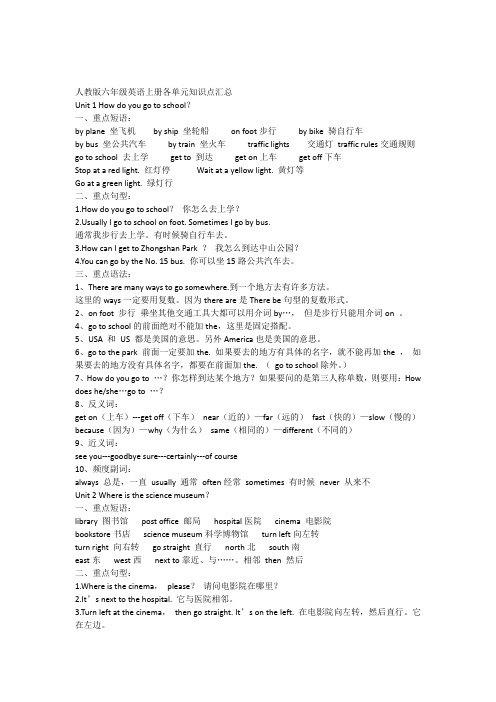
人教版六年级英语上册各单元知识点汇总Unit 1 How do you go to school?一、重点短语:by plane 坐飞机by ship 坐轮船on foot步行by bike 骑自行车by bus 坐公共汽车by train 坐火车traffic lights 交通灯traffic rules交通规则go to school 去上学get to 到达get on上车get off下车Stop at a red light. 红灯停Wait at a yellow light. 黄灯等Go at a green light. 绿灯行二、重点句型:1.How do you go to school?你怎么去上学?ually I go to school on foot. Sometimes I go by bus.通常我步行去上学。
有时候骑自行车去。
3.How can I get to Zhongshan Park ?我怎么到达中山公园?4.You can go by the No. 15 bus. 你可以坐15路公共汽车去。
三、重点语法:1、There are many ways to go somewhere.到一个地方去有许多方法。
这里的ways一定要用复数。
因为there are是There be句型的复数形式。
2、on foot 步行乘坐其他交通工具大都可以用介词by…,但是步行只能用介词on 。
4、go to school的前面绝对不能加the,这里是固定搭配。
5、USA 和US 都是美国的意思。
另外America也是美国的意思。
6、go to the park 前面一定要加the. 如果要去的地方有具体的名字,就不能再加the ,如果要去的地方没有具体名字,都要在前面加the. (go to school除外。
)7、How do you go to …?你怎样到达某个地方?如果要问的是第三人称单数,则要用:How does he/she…go to …?8、反义词:get on(上车)---get off(下车)near(近的)—far(远的)fast(快的)—slow(慢的)because(因为)—why(为什么)same(相同的)—different(不同的)9、近义词:see you---goodbye sure---certainly---of course10、频度副词:always 总是,一直usually 通常often经常sometimes 有时候never 从来不Unit 2 Where is the science museum?一、重点短语:library 图书馆post office 邮局hospital医院cinema 电影院bookstore书店science museum科学博物馆turn left向左转turn right 向右转go straight 直行north北south南east东west西next to靠近、与……。
(完整word版)PEP人教版六年级英语上册各单元复习要点
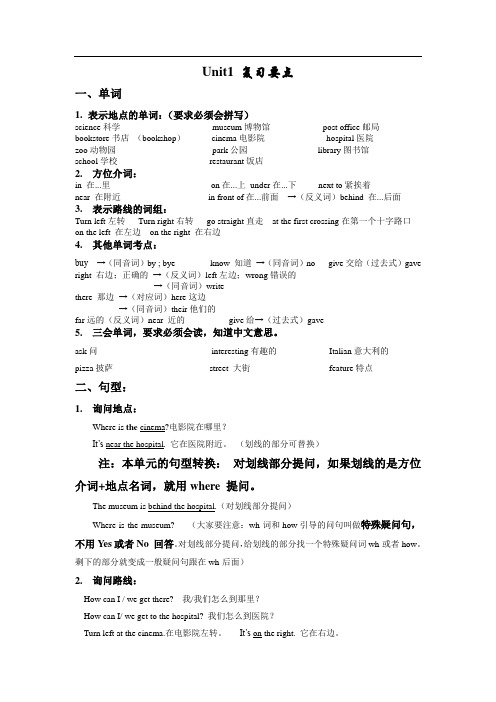
Unit1 复习要点一、单词1.表示地点的单词:(要求必须会拼写)science科学museum博物馆post office邮局bookstore书店(bookshop)cinema电影院hospital医院zoo动物园park公园library图书馆school学校restaurant饭店2.方位介词:in 在...里on在...上under在...下next to紧挨着near 在附近in front of在...前面→(反义词)behind 在...后面3.表示路线的词组:Turn left左转Turn right右转go straight直走at the first crossing在第一个十字路口on the left 在左边on the right 在右边4.其他单词考点:buy →(同音词)by ; bye know 知道→(同音词)no give交给(过去式)gave right 右边;正确的→(反义词)left左边;wrong错误的→(同音词)writethere 那边→(对应词)here这边→(同音词)their他们的far远的(反义词)near 近的give给→(过去式)gave5.三会单词,要求必须会读,知道中文意思。
ask问interesting有趣的Italian意大利的pizza披萨street 大街feature特点二、句型:1.询问地点:Where is the cinema?电影院在哪里?It’s near the hospital. 它在医院附近。
(划线的部分可替换)注:本单元的句型转换:对划线部分提问,如果划线的是方位介词+地点名词,就用where 提问。
The museum is behind the hospital.(对划线部分提问)Where is the museum? (大家要注意:wh-词和how引导的问句叫做特殊疑问句,不用Yes或者No 回答。
六年级英语上册重点单词、短语和句子
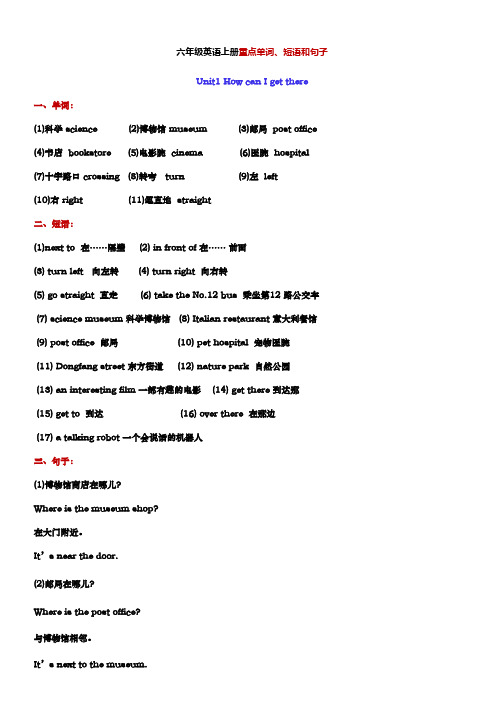
六年级英语上册重点单词、短语和句子Unit1 How can I get there一、单词:(1)科学 science(2)博物馆 museum(3)邮局post office (4)书店 bookstore(5)电影院 cinema(6)医院 hospital (7)十字路口 crossing(8)转弯 turn(9)左left(10)右 right(11)笔直地 straight二、短语:(1)next to 在……隔壁(2) in front of 在……前面(3) turn left 向左转(4) turn right 向右转(5) go straight 直走(6) take the No.12 bus 乘坐第12 路公交车(7) science museum 科学博物馆(8) Italian restaurant 意大利餐馆(9) post office 邮局(10) pet hospital 宠物医院(11) Dongfang street 东方街道(12) nature park 自然公园(13) an interesting film 一部有趣的电影(14) get there 到达那(15) get to 到达(16) over there 在那边(17) a talking robot 一个会说话的机器人三、句子:(1)博物馆商店在哪儿?Where is the museum shop?在大门附近。
It’s near the door.(2)邮局在哪儿?Where is the post office?与博物馆相邻。
It’s next to the museum.(3)我们怎么到那儿?How can we get there?到书店左转,然后到医院右转Turn left at the bookstore. Then turn right at the hospital.Unit2 Ways to go to school一、单词:(1)步行 on foot(2)乘 by(3)公共汽车 bus(4)飞机 plane(5)出租车 taxi(6)大船 ship(7)地铁 subway(8)火车 train(9) slow(使)放慢速度;慢的(10) 减少; 降低 down(11)慢下来 slow down(12)停下 stop二、短语:(1)on foot 步行(2) by bus 乘坐公交车(3) by plane 乘飞机(4)by taxi 坐出租车(5) by ship 乘坐轮船(6) by boat 坐小船(7) buy train 坐火车(8) by subway 坐地铁(9) by bike 骑行(10) by car 坐小汽车(11) by ferry 乘坐渡船(12) by sled 坐雪橇(13) go to school 去上学(说话时不在学校)(14) come to school 来上学(说话时在学校)(15) pay attention to 注意……(16) traffic lights 交通信号灯(17) good exercise 有益的锻炼/运动(18) get there 到那儿(19) so many 如此多(20) cross the road 过马路(21)a life jacket 救生衣(22) drive slowly 开慢点(23) be different from 与……不同(24) take a bus 乘坐公交车(25) ride a bike 骑自行车(26) on the left side 在左边(27) on the right side 在右边(28) the same as 与……一样(28) go to work 去工作/去上班(29) at the cinema 在电影院(30) play with sb 和某人玩(31) go home 回家(32) at school 在学校(33) at home 在家三、句子:(1)你怎么来学校的?How do you come to school.通常我步行来,有时我乘公共汽车来。
苏教版 六年级英语上册 复习整理 所有英语单词词组
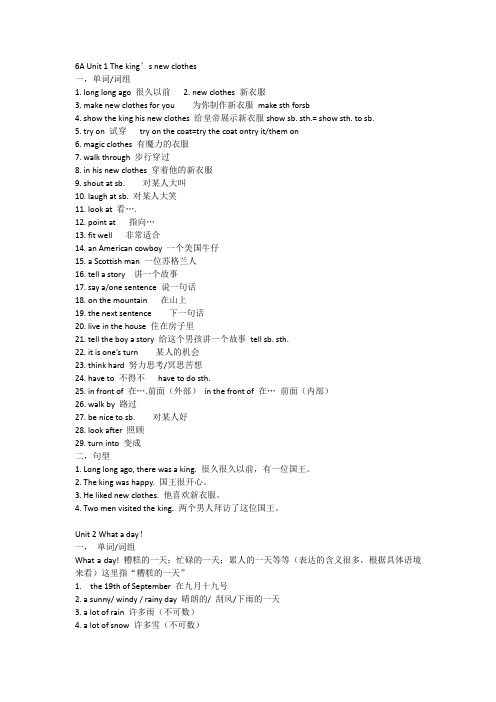
6A Unit 1 The king’s new clothes一,单词/词组1. long long ago 很久以前2. new clothes 新衣服3. make new clothes for you 为你制作新衣服make sth forsb4. show the king his new clothes 给皇帝展示新衣服show sb. sth.= show sth. to sb.5. try on 试穿try on the coat=try the coat ontry it/them on6. magic clothes 有魔力的衣服7. walk through 步行穿过8. in his new clothes 穿着他的新衣服9. shout at sb. 对某人大叫10. laugh at sb. 对某人大笑11. look at 看….12. point at 指向…13. fit well 非常适合14. an American cowboy 一个美国牛仔15. a Scottish man 一位苏格兰人16. tell a story 讲一个故事17. say a/one sentence 说一句话18. on the mountain 在山上19. the next sentence 下一句话20. live in the house 住在房子里21. tell the boy a story 给这个男孩讲一个故事tell sb. sth.22. it is one’s turn 某人的机会23. think hard 努力思考/冥思苦想24. have to 不得不have to do sth.25. in front of 在….前面(外部)in the front of 在…前面(内部)26. walk by 路过27. be nice to sb. 对某人好28. look after 照顾29. turn into 变成二,句型1. Long long ago, there was a king. 很久很久以前,有一位国王。
六年级英语上册M5Unit1CanyoubemyChinesepenfriend知识清单外研版

一、重点单词1、address 地址补充:形近词 dress 连衣裙。
ad(广告)+dress(连衣裙)=address(地址)。
Email address 电子邮件地址。
二、短语积累1、pen friend 笔友补充:同义短语为 pen pal。
2、speak English 说英语3、be from 来自4、have got 有5、two friends from the UK 两个来自英国的朋友6、write to 给……写信7、of course 当然8、want a pen friend from the US 想要一个来自美国的笔友9、in China 在中国10、in Chinese 用汉语11、in English 用英语12、play chess 下国际象棋13、play football 踢足球三、句型总结1、询问对方可以成为自己的笔友吗:Can you be my (+其他) pen friend?原句:Can you be my Chinese pen friend?肯定回答:Yes, I can.否定回答:No, I can not.2、表达“有”的there be句型:There is/are +名词(+其他)。
原句: Look, there’s a panda!注意:there be句型要遵循就近原则,is、are选用哪一个由离be动词最近的名词的形式决定!原句:Can he speak English?肯定回答:Yes, 主语+can.否定回答:No, 主语+ can +not.此句型是一般疑问句,can是情态动词,意为“能,可以”,没有人称和数的变化。
4、Hello!你好!(常用语)补充:hello一般用于初次见面或者是不是很熟的人之间的打招呼。
如果是熟人,一把用hi。
5、介绍某人的句型:This is +人名或事物(+其他)。
原句:This is my cousin Daming.6、表达来自某地的句型:主语+is from +地名。
六年级英语上册知识点复习汇总
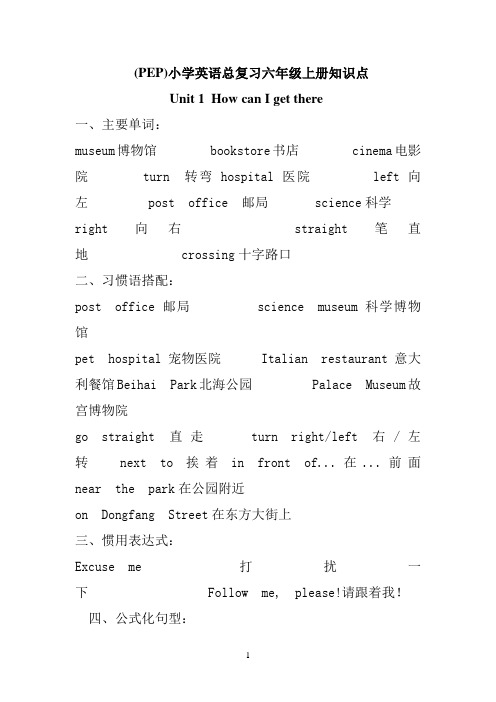
(PEP)小学英语总复习六年级上册知识点Unit 1 How can I get there一、主要单词:museum博物馆bookstore书店cinema电影院turn 转弯hospital医院left向左post office 邮局science科学right向右straight笔直地crossing十字路口二、习惯语搭配:post office邮局science museum科学博物馆pet hospital宠物医院Italian restaurant意大利餐馆Beihai Park北海公园 Palace Museum故宫博物院go straight直走turn right/left右/左转next to挨着in front of...在...前面near the park在公园附近on Dongfang Street在东方大街上三、惯用表达式:Excuse me 打扰一下Follow me, please!请跟着我!四、公式化句型:1、问路的句型及其答语:问句:Where is the + 地点······在哪儿答语:It's + 表示地点的词语(next to the bookstore,near the hospital/post office, over there,on Dongfang Street, infront of the school... )2、询问怎么到某地的句型及其答语:问句:How can +主语+ get (to)+地点·····怎么到·····同义句型:Can you tell me the way to +地点Where is + 地点Which is the way to +地点五、例句:Where is the cinema, please 请问电影院在哪里It's next to the hospital.它与医院相邻。
六年级英语上册Unit1-5单元单词短语

Unit 1 Public signs单词:堂(表)兄弟问题公共的标志意思是危险必须(离)开草不接近笼子安静噪声某事快地总是吸烟丢,扔骑自行车停放突然地钞票,纸币比赛在周围,四面附近的看守人指出罚款废物垃圾箱词组:1.禁止停车2.禁止吸烟3.禁止吃喝4.禁止践踏草坪5.禁止乱丢杂物6.禁止触摸7.安静8.朝他走去9.罚款5元10.在鸟笼上11.指向24.进去12.只有四岁13.有许多问题14.问问题15.公共标志16.禁止骑车17.在危险中18.制造噪音19.散步20.走向纸币21.一公园看守员22.环顾23.在草地上走25.建筑上的标志26.远离27.禁止拍照28.穿绿色衣服29.穿红色连衣裙的女孩30.作为早餐31.握手32.再试一次33.一张十元钞票句型:1.这个标牌是什么意思?它意指“危险”。
2.那个标牌什么意思?它意指你不应该在草地上走。
3.它是什么意思?它意指你应该远离建筑物。
.4.我现在可以看电视了吗?不,你不可以。
你应该先做你的家庭作业。
5.杰克只有四岁,但他总是有许多问题要问。
6.他正在问本一些有关公共标志的问题。
7.我可以进去吗?不,你不可以。
你必须远离这座建筑物。
部分语言点解析1.动词如果在N o后表示禁止做某事,动词要用in g形式,如:No swimmi ng;如果前面是d on’t 或者do not后面跟动词原形,如:Do not touch.2.must, would, should (should n’t),can,may的区别must 表示必须一定做到的事情;would表示想要做的事情,wouldlike to do sth.should(should n’t)表示应该或不应该;can表示能够,会做某事;may表示可以或允许做某事。
must, should should n't, can, may都是情态动词,后面都跟动词原形。
新版PEP小学英语六年级上册1-6单元知识点总结

六年级PEP上册知识总结Unit1 How can I get there?library 图书馆post office 邮局hospital 医院turn left 左转 turn right 右转places: cinema 电影院(地点) bookstore 书店go straight 直行 science museum科学博物馆crossing 十字路口supermarket 超市school 学校一、描述某地点所处位置的短语near 在…..附近next to 与…..相邻beside 在…..旁边in front of 在……前面behind 在…..后面between 在…..之间二、问路1.Where is the cinema, please? 请问电影院在哪儿?next to the hospital. 在医院的旁边。
in front of the school. 在学校的前面.behind the park 在公园的后面It’s near the zoo. 在动物园的附近.far from here. 离这儿很远.2. Excuse me, is there a cinema near here 请问这附近有电影院吗?Yes, there is. /No,there isn’t. 有./没有。
3. How can I/we get there? 我怎样到那儿?Turn left at the bookstore. 到书店左转4. How can I get to the hospital? 我该怎样到达医院呢?Take the No.57 bus. 乘坐第57路公汽。
By the No. 57 bus.注意:到那儿 get there到某地 get to Canada/Australia/Beijing/ Shanghai/Wuhan get to the hospital/zoo/bookstore二、指引路1. You can take the No.32 bus. 你可乘坐312路公交车去那儿.注意:You can go by the No.32 bus. 与上句意思一样,只是说法不同。
译林英语六年级上册英语第一单元知识点梳理

译林英语六年级上册英语第一单元知识点梳理Unit1 短语、词汇、知识点梳理一、第一单元短语1.皇帝的新衣the king’s new clothes2.很久很久以前long long ago3.有一个国王there was a king4.某一天one day5.两个男子/女子two men/women6.拜访国王visit the king7.为你做新衣服make new clothes for you8.给国王看他的新衣show the king his new clothes9.试穿try on10.这些魔法衣these magic clothes11.聪明的人clever people12.愚蠢的人foolish people13.看见他们see them14.穿过城市walk through the city15.穿着他的新衣in his new clothes/ wear his new clothes16.有许多人there were a lot of people17.在街上in the street18.看着国王look at the king19.多么漂亮的衣服啊!What beautiful clothes! =How beautiful the clothesare!20.一个小男孩 a little boy21.指着国王point at/to the king22.嘲笑他laugh at him23.非常合身fit well24.今天下午this afternoon25.一张来自我好友Mark的卡片 a card from my good friend Mark26.来参加我的聚会come to my party27.在四点半at half past four28.在公园里in the park29.一个美国牛仔an American cowboy30.穿着牛仔裤wear jeans31.一个苏格兰男士 a Scottish man32.穿一条苏格兰裙wear a kilt33.狐狸老师和她的学生们Miss Fox and her students34.讲故事tell a story35.每个学生说一个句子。
- 1、下载文档前请自行甄别文档内容的完整性,平台不提供额外的编辑、内容补充、找答案等附加服务。
- 2、"仅部分预览"的文档,不可在线预览部分如存在完整性等问题,可反馈申请退款(可完整预览的文档不适用该条件!)。
- 3、如文档侵犯您的权益,请联系客服反馈,我们会尽快为您处理(人工客服工作时间:9:00-18:30)。
一、单词
1.假日,假期
2.最后的
3.早的,早地
4.国家的
5.在…以前
6.(do过去式)
7.品尝
8.农场,农庄
9.电影
10.胡萝卜
11.挤奶
12.母牛,奶牛
13.有趣的事,
娱乐
14.采,摘
15.精彩的
16.拔,拖
17.野营,营地
18.排球,
19.山,
20.萝卜
二、词组
6)本正和他的家人讨论关于他的生日聚会的事。
8)本正在吹灭蛋糕上的蜡烛。
9)阿拉丁正脱掉他的戏服。
部分语言点解析
(1)I’d like=I would like我想要某物==I want…
I’d like to = I would like to我想要做某事== I want to…
would like想要的意思。可用于表示邀请,后面如果加动词用would like to +动词原形
5.试着记住物品所在的位置。
6.有一只熊在那里的梨树底下,但是现在在哪里呢?
语法:
一般过去式含有be动词的句子结构肯定句:主语+was / were +其它否定句:主语+wasn’t / weren’t +其它一般疑问句:Was / Were +主语+其它
特殊疑问句:疑问词+以was/were开头的一般疑问句
Unit 2Ben’s birthday
词组:
1.本的生日
2.一起回家
3.十月16号
4.拜访某人
5.谈论某事
6.和某人谈话
7.日本卡通片
8.作为一个生日礼物
9.举行生日聚会
10.祝你生日快乐!
11.等会儿看
12.脱掉你的鞋
13.吹灭蜡烛
14.在本的生日聚会上’
15.通过电话
16.马上到,就要来了17.做张生日贺卡22和我的家人在一起三、句子
1.今天是节后上学的第一天。
2.你在上周做了些什么?我周三和我的父母一起看了场电影。
3.你们在农场做什么?我们浇树和拔胡萝卜。
4.昨天瓶子里有果汁吗?是的,有。
5.上周在野营营地上格林老师做了许多美味的食物。
6.今天晚上我右边的灯不是很亮。
7.你还做了什么?我品尝了橘子。
6.他正在问本一些有关公共标志的问题。
7.我可以进去吗?不,你不可以。你必须远离这座建筑物。
部分语言点解析
1.动词如果在No后表示禁止做某事,动词要用ing形式,如:No swimming;
如果前面是don’t 或者do not后面跟动词原形,如:Do not touch.
2.must, would, should (shouldn’t), can,may的区别
must表示必须一定做到的事情;would表示想要做的事情,would like to do sth.
should(shouldn’t)表示应该或不应该;can表示能够,会做某事;may表示可以或允许做某事。must, should shouldn't, can, may都是情态动词,后面都跟动词原形。
1.国庆假日
2.上星期
3.上学第一天
4.假日后
5.在学校操场上
6.上课前
7.观看一场电影
8.一部有趣的卡通片
9.参观农场
10.在农场上
11.品尝它们
12.拔胡萝卜
13.给奶牛挤牛奶
14.捡鸡蛋
15.种花
16.摘许多橘子
17.在山上行走
18.想要去农场
19..在一个野营营地上
20.煮很多食物
21.在农场
on表示具体的某一天,常用在星期,具体的一天前。
例如:on Monday在星期一on the first of March在三月一日
at用在时刻前例如:at ten o'clock在十点钟
Unit 3It was there!
单词:
1.(am,的过去式)
2.激动的,兴奋的
3.片刻,瞬间
4.以前
5.(are的过去式)
18.一张纸
19.在海湾
20.中国的新年
21.在日历上
22.马上,立刻
23.一张纸
24.写信息
25.一大早
26.在4月五日
27.在三月
28.把它对折
句型:
1)今天几号?今天是九月二十三号。
2)你何时过生日?我的生日是十月十八号。
3)你想要什么东西作为生日礼物?我想要一个日本卡通片的光盘。
5)你们经常举行生日聚会吗?
例1 I’d like some balloons.→Would you like some balloons?
=I want some balloons .→Do you want some balloons ?
2 I’d like to watch TV .→Would you like to watch TV?
10.在地上
11.把它们捡起来
12.弹吉他
13.想知道
14.在门后面
15.一副眼镜
16.一卷胶卷
17.在你桌子上的抄写本旁
18.试着记住
句型:
1.我的日记在哪里?它在课桌上。它现在不在那里了。一会儿前它还在的。
2.你的眼镜在哪里?它在我的笔袋旁。它现在不在那里了。刚才还在的。
3.能把胶卷给我吗?
4.苏海正在教她客厅里一些东西的名称。
8.朝他走去
9.罚款5元
10.在鸟笼上
11.指向
24.进去
12.只有四岁
13.有许多问题
14.问问题
15.公共标志
16.禁止骑车
17.在危险中
18.制造噪音
19.散步
20.走向纸币
21.一公园看守员
22.环顾
23.在草地上走
25.建筑上的标志
26.远离
27.禁止拍照
28.穿绿色衣服
29.穿红色连衣裙的女孩
6.眼镜
7.照相机
8.光盘随声听
9.卷,卷状物
10.胶卷
11.地面
12.令人激动的
13.耳机
14.日记,日记簿
15.记住,记得
16.手机
17.比赛
18.有趣的
19.试试
20.在…之前
词组:
1.体育运动日
2.所有的学生
3.观看赛跑
4.非常的兴奋
5.寻找
6.非常令人兴奋
7.片刻之前
8.让我看(想)
9.刚才
Unit 1Public signs
单词:
堂(表)兄弟
问题
公共的
标志
意思是
危险
必须
(离)开
草
不接近
笼子
安静
噪声
某事
快地
总是
吸烟
丢,扔
骑自行车
停放
突然地
钞票,纸币
比赛
在周围,四面
附近的
看守人
指出
罚款
废物
垃圾箱
词组:
1.禁止停车
2.禁止吸烟
3.禁止吃喝
4.禁止践踏草坪
5.禁止乱丢杂物
6.禁止触摸
7.安静
=I want to watch TV .→Do you want to watch TV?
(2)介词in. on at的用法
in表示:“段”时间,常用在年份,月份,季节前,也用在上午,下午和晚上前。
例如:in 1997在1997年in spring在春季in May在五月
in the moring在上午in the afternoon在下午in the evening在晚上
30.作为早餐
31.握手
32.再试一次
33.一张十元钞票
句型:
1.这个标牌是什么意思?它意指“危险”。
2.那个标牌什么意思?它意指你不应该在草地上走。
3.它是什么意思?它意指你应该远离建筑物。.
4.我现在可以看电视了吗?不,你不可以。你应该先做你的家庭作业。
5.杰克只有四岁,但他总是有许多问题要问。
